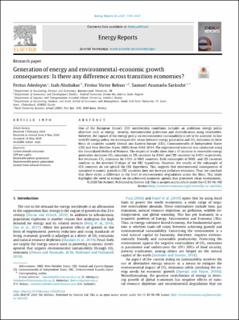| dc.contributor.author | Adedoyin, Festus | |
| dc.contributor.author | Isah, Abubakar | |
| dc.contributor.author | Bekun, Festus Victor | |
| dc.contributor.author | Sarkodie, Samuel Asumadu | |
| dc.date.accessioned | 2020-07-06T13:42:06Z | |
| dc.date.available | 2020-07-06T13:42:06Z | |
| dc.date.created | 2020-06-01T02:28:33Z | |
| dc.date.issued | 2020 | |
| dc.identifier.citation | Adedoyin, F., Abubakar, I., Bekun, F. V. & Sarkodie, S. A. (2020). Generation of energy and environmental-economic growth consequences: Is there any difference across transition economies? Energy Reports, 6, 1418-1427. doi: | en_US |
| dc.identifier.issn | 2352-4847 | |
| dc.identifier.uri | https://hdl.handle.net/11250/2660864 | |
| dc.description.abstract | One of the European Union’s (EU) membership conditions includes an ambitious energy policy objective such as energy security, environmental protection and diversification using renewables. However, the impact of the energy policy on environmental sustainability is yet to be assessed. In line with EU energy policy, we investigate the nexus between energy generation and CO2 emissions in three blocs of countries namely Central and Eastern Europe (CEE), Commonwealth of Independent States (CIS) and New Member States (NMS) from 1992–2014. The experimental exercise was conducted using the Generalized Method of Moment. The empirical results show that a 1% increase in renewable energy generation increases CO2 emissions in CIS countries by 0.04% and CEE countries by 0.02% respectively, but decreases CO2 emissions by 0.02% in NMS countries. Both subsamples of NMS and CIS countries conform to the inverted U-shape of the EKC hypothesis. However, the results of the subsample of CEE countries do not uphold the EKC hypothesis. This, suggests that environmental consequences of sustained economic growth in CEE countries does not increase pollutant emissions. Thus, we conclude that there exists a difference in the level of environmental degradation across the blocs. This study highlights the need to embark on decarbonized economic agenda that prioritizes clean environment. | en_US |
| dc.language.iso | eng | en_US |
| dc.publisher | Elsevier | en_US |
| dc.rights | Attribution-NonCommercial-NoDerivatives 4.0 Internasjonal | * |
| dc.rights.uri | http://creativecommons.org/licenses/by-nc-nd/4.0/deed.no | * |
| dc.title | Generation of energy and environmental-economic growth consequences: Is there any difference across transition economies? | en_US |
| dc.type | Peer reviewed | en_US |
| dc.type | Journal article | en_US |
| dc.description.version | publishedVersion | en_US |
| dc.rights.holder | © 2020 The Author(s) | en_US |
| dc.subject.nsi | VDP::Samfunnsvitenskap: 200::Økonomi: 210 | en_US |
| dc.subject.nsi | VDP::Teknologi: 500::Miljøteknologi: 610 | en_US |
| dc.source.pagenumber | 1418-1427 | en_US |
| dc.source.volume | 6 | en_US |
| dc.source.journal | Energy Reports | en_US |
| dc.identifier.doi | https://doi.org/10.1016/j.egyr.2020.05.026 | |
| dc.identifier.cristin | 1813351 | |

